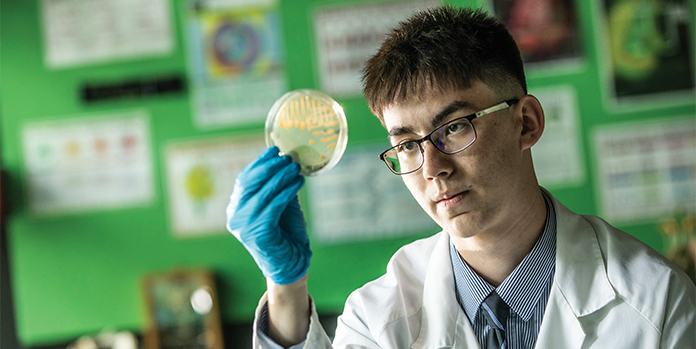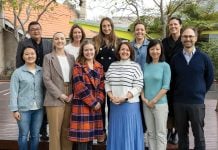Richard Xu has had a busy year. He has published two scientific research papers in peer reviewed academic journals and presented at three academic conferences. This is all the more astounding when you appreciate that Richard is just 16 years old.
A Year 10 boarder at Melbourne Grammar School, Richard has been undertaking microbiological research for some years now. His first project, which he commenced at his former school in Hong Kong, focused on isolating new species of bacteria which have the potential to help reduce climate change.
“We were specifically looking for bacteria which metabolise methanol, a chemical which has the potential to contribute to ozone formation and is a natural precursor to formaldehyde, a potent carcinogen,” Richard explains.
“As many plants produce methanol, it is commonly found at relatively high levels in the soil of large crop plantings. We were looking for new bacteria which might be used in agricultural settings to ‘consume’ the methanol before it is dispersed into the atmosphere. In addition, as methanol is growing in use as an alternative fuel source, the bacteria could also play a role in mitigating the methanol emissions (and thereby the resultant levels of formaldehyde and other dangerous chemicals) associated with that practice.”
And Richard’s work has been successful. He isolated two new species, and published papers describing their characteristics and genome (DNA sequence) so that other scientists can capitalise on his work and apply his findings in practical scenarios.
A new project with new possibilities
Richard’s latest project has a similar approach, but he is looking for glyphosate resistant and glyphosate consuming bacteria in areas around the Yarra River this time. (Glyphosate is a chemical found in weed killers which also kills many strains of bacteria.)
Guided by Simon Maaser, Head of Science and Technology at Melbourne Grammar, Richard has sampled the river water and soil across a number of locations and is currently culturing and testing the bacterial strains he found there.
“Bacteria are known to evolve quickly to suit their environment,” says Richard. “High levels of glyphosate resistant bacteria in soil or water would seem to indicate that high levels of glyphosate have or are present. This tells us something about the carriage and deposits of glyphosates along the river, and informs how we might manage it better in the future.”
“However, if we can also find bacteria that have the capacity to degrade glyphosate and remove it from the environment, that has practical advantages for our ecosystem.”
“The DNA sequencing component of my work is important because, if we can isolate the genes which are associated with methanol or glyphosate resistance or degradation, then we can put them into harmless bacteria and use it on a large scale in the agricultural industry.”
Future plans and aspirations
Richard’s conference activities to date include presenting posters at the American Society of Microbiology and the Australian Microbiology Association annual meeting. Next year he aims to be a speaker at the American Society of Microbiology conference.
Beyond that, Richard sees his future including a strong research component. “I might explore a medical degree, but I want to make sure I can keep doing research. I really enjoy it.”



